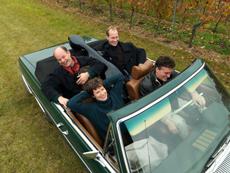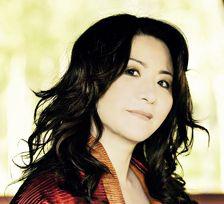This year the
Mandelring Quartet celebrate the 25th anniversary of its concert-début. Considering its members’ birthdates (1964 – 72), many people may find it amazing that the quartet has actually been in existence for a quarter of a century. People who know that three of its members are siblings and have played music together since their youth will be perhaps less amazed.
In the
early 1980s Sebastian, Nanette and Bernhard Schmidt, along with a friend, began to appear as a string quartet on festive occasions. As their appearances became more frequent, the idea arose to probe more deeply into the quartet genre. Thus, in 1983, the Mandelring Quartet came into existence. They took their name from the place where they rehearsed, a former vineyard on a road lined with almond trees (“Mandeln”). The Mandelring Quartet has been in existence since 1983 with only one brief interruption for a year of study in the USA. Violist Roland Glassl joined the quartet in 1999.
In the fifth year of its existence, the ensemble drew attention with a CD recording of Schubert’s “
Death and the Maiden” Quartet. A year later it was placed under contract by the Sudbrack Agency in Hamburg. The resultant concert engagements quickly helped it to garner a fine reputation. The quartet soon mastered a large repertoire, thus acquiring a solid basis for its carrier. From 1991 to 1994 it won
several major competitions (Munich, Evian, Paolo Borciani), which soon led to recitals in the major European concert halls. Since then the Mandelring Quartet has performed in fifty countries all over the globe as one of the leading international quartets of our time.
The musicians also left a clear artistic imprint on the programs of the
HAMBACHERMusikFEST, an international chamber music festival founded under the artistic direction of the Mandelring Quartet in 1997. The festival has quickly advanced to become a meeting place for chamber music aficionados from all over the world.
The Mandelring Quartet’s versatility and wide-ranging repertoire is heard on twenty CD releases. Since 2001 it has issued its recordings
on the audite label, including three Brahms quartets in combination with works by a contemporary (Dessoff, Gernsheim, Herzogenberg), and six Schubert quartets. The Mandelring Quartet is currently recording a complete set of all fifteen Shostakovitch quartets.
Dynamism, vitality, colour, imagination, humour, excitement, rigor, textual fidelity, homogeneity and great delight in playing: all these characteristics describe the playing of the Mandelring Quartet. We can hear it on their CDs and feel it even more vividly in their many recitals.









